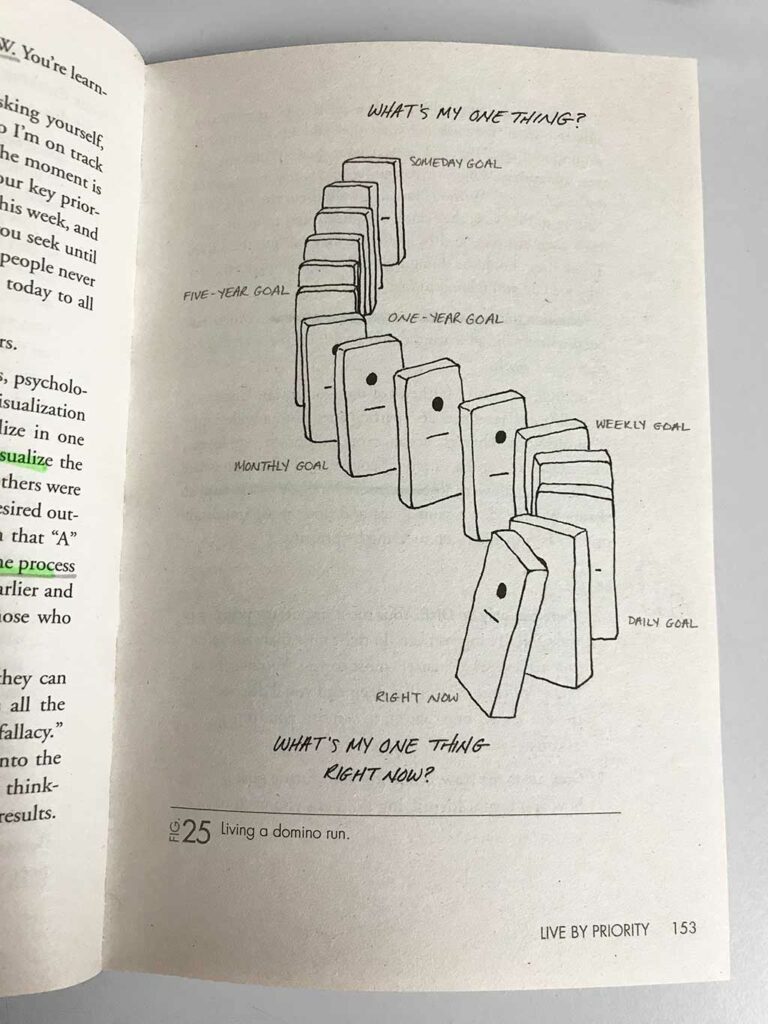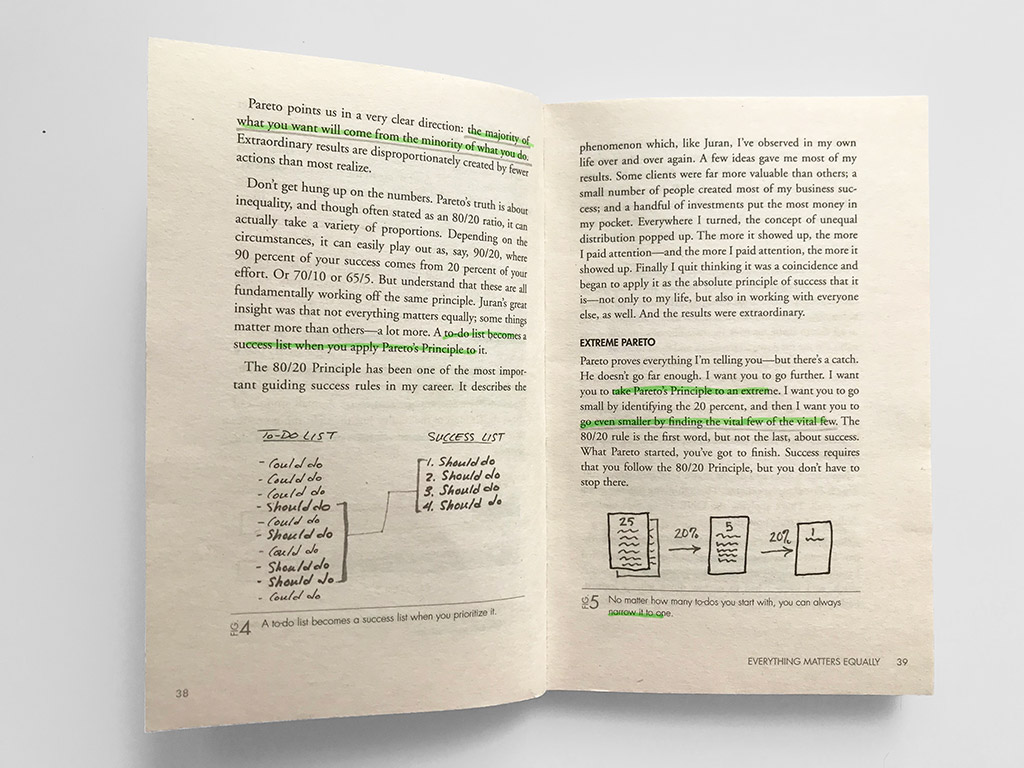Title: The One Thing
Author: Gary Keller, Jay Papasan
Year: 2014
Back cover text:
The New York Times bestseller that will help you find the ONE thing you need to do that will make everything else easier – or unnecessary.
You want fewer distractions and less on your plate. The daily barrage of e-mails, texts, tweets, messages, and meetings distract you and stress you out. The simultaneous demands of work and family are taking a toll. And what’s the cost? Second-rate work, missed deadlines, smaller pay cheques, fewer promotions – and lots of stress. AND YOU WANT MORE. You want more productivity from your work. More income for a better lifestyle. You want more satisfaction from life, and more time for yourself, your family, and your friends.
In The ONE Thing, you’ll learn to * Cut through the clutter * Achieve better results in less time * Build momentum toward your goal * Dial down the stress * Overcome that overwhelmed feeling * Revive your energy * Stay on track * Master what matters to you The ONE Thing is the New York Times bestseller that delivers extraordinary results in every area of your life – work, personal, family, and spiritual.
WHAT’S YOUR ONE THING?

My Review
Stars (1/5):
Writing:
I love reading books like these. I think this is a great book. And a joy to read.
Does the book deliver (its title)?:
Yes, absolutely.
Biggest take away/s:
- What’s the ONE thing you can do this week such that by doing it everything else would be easier or unnecessary.
- “Going small” is doing what you should do, what matters most.
- Do a few things for more effect instead of doing more things with side effects.
- Getting extraordinary results is all about creating a domino effect in your life.
- Everyday line up priorities anew, find the lead domino.
- Success begat success.
- Success is built sequentially, it’s one thing at a time.
- Success leaves clues.
- No one succeeds alone. One person makes all the difference.
- You must be single-minded.
- Passion→ time working on it → skill improvement→ results improvement.
- Bill Gates one passion in High School was computers →skill computer programming→ one Persson (Paul Allen) → Richest man in the world.
- Have a clear formula for making decisions → progress.
- Instead of a to-do list. Have a success list.
- Success lists are short and aim you in a specific direction—an organized directive.
- Selected efforts create almost all of the rewards. Only what you should do gets on this list. Go even smaller by finding the vital few, the one thing.
- Say “not now” to anything else.
- Multitaskers experience more life-reducing, happiness squelching stress.
- Workers are interrupted every 11 minutes and spend 1/3 of their day recovering from these distractions.
- You can only focus effectively on one thing at once. Focus occurs in the prefrontal cortex.
- Phone conversations while driving take 40% of your focus.
- Do what matters most and give it your undivided attention.
- Do the right thing, choose the right habit.
- success is about doing the right thing, not about doing everything right.
- Be a person of powerful habits and use selected discipline to develop them.
- When you do the right thing, it also simplifies your life, your life gets clearer.
- Lock in one habit so it becomes part of your life.
- Build the right habit, and extraordinary results will find you.
- It takes about 66 days to acquire a new habit.
- All good things come to those who wait (The MarshmallowTest).
- Will power needs downtime to recharge.
- The brain takes 1/5 of our calories for energy.
- Foods that elevate your blood sugar evenly over long periods: complex carbohydrates and proteins.
- When willpower runs out we revert to our default settings. therefore protect your willpower to reserve it for the things thins that matter most.
- Don’t fight your willpower, build your days around it.
- A balanced life is a lie. Magic happens at the extremes. Success lies in the outer edges.
- Counterbalancing is essential to your well-being. Be aware of your personal needs (friends, body, spirit).
- Work is like a rubber ball if you drop it, it will bounce back.
- Separate your work and personal life into two distinct buckets for counterbalancing.
- Thinking big is essential to extraordinary results. Big is not bad or scary. It is about who you can become.
- Bold ideas might threaten your comfort zones but simultaneously reflect your greatest opportunities.
- Think as big as you possibly can.
- Big requires growth, a growth mindset generally thinks big and seeks growth. Growth-minded students employ better strategies, experience less helplessness, exhibit more positive effort and achieve more. Set your mindset to it, until the right mindset becomes routine.
- Study people who have already achieved it. What are their models, systems, habits, and relationships?
- Ask bigger questions, double down.
- Think big, aim high, act bold.
- We fail our way to success. Keep striving for your true potential.
- Do less. Do a handful of things well.
- Put all your eggs in one basket.
- Aks the right questions, to get the right answer.
- Big picture questions (Where am I going, What target should I aim for). Small focus (What must I be doing right now to be on the path to getting the big picture? Where is the bullseye?)
- The focusing question:
- What’s the ONE thing you can do /such/ (this week) that by doing it (everything else would be easier or unnecessary) = leverage. The last part elevates the answer’s potential to change your life by doing the leveraged thing and avoiding distractions.
- – Big picture questions (Where am I going, What target should I aim for).
- – Small focus (What must I be doing right now to be on the path to getting the big picture? Where is the bullseye?)
- Big picture, small focus. Finding the right direction and finding the right action.
- What’s my one thing NOW. What my one thing “levered action”. You will make the best progress on your most important work.
- Asking the Focusing Question is the ultimate success habit for your life.
- The Focusing Question is a way of life, to find the most leveraged priority. I continue to ask it until I can see the connection all my dominos are lined up.
- Apply it to the important areas (the cornerstones)like spiritual life, physical health, personal life, key relationships, business, and financial life and address them in this order.
- You can also include a time frame. For example, for my job, what is the ONE thing I can do to ensure I will hit my goals this week, such that by doing it everything else will be easier or unnecessary?
- Start each day by asking, “What’s the ONE thing I can do today for […] such that by doing it everything else will be easier or even unnecessary?”
- Make this a Succes Habit (by doing it 66 days).
- Put up reminders like, “The ONE thing=Extraordinary Results.
- Practice the Success Habit every day.
- A big answer lives outside your comfort zone, never in plain sight. Search for clues and role models, research, model, benchmark, and trend their experience. Build your actions on the back of their lessons.
- A new answer usually requires a new behavior.
- Turn it into a question. From, I’d like to do that too, How do I achieve it?
- Your big ONE Thing is your purpose. And your small ONE Thing is the priority you take action on to achieve it. Productive and profit is visible to the public.
- Five factors that contribute to our happiness: Positive emotion and pleasure, achievement, relationships, engagement, and meaning.
- Know where you are going.
- Purpose, The ONE Thing you want your life to be about more than any other. Try writing down something you’d like to accomplish and describe how you’d do it.
- Set a future goal and methodically drill down to what you should be doing right now. → today → this week → this month. You are lining up your dominoes.
- Students who visualize the process of getting an A performed better.
- Those who wrote down their goals were 39.5% more likely to accomplish them
- To accomplish your ONE Thing block off the appropriate time every day so it becomes a habit.
- Devote every day to becoming great.
- Time block, 1. Your time off. (long weekends, Four days. long vacations) 2. Your ONE Thing. (After 1 hour of morning priorities, move to your One Things: Mon-Fri 4 hours) 3. Your planning time. (Sunday 1 hour, review your annual and monthly goals).
- Productive people work on event time. They don’t quit until they ONE Thing is done.
- If you erase you must replace (reschedule your time block).
- Elite performers, deliberate practice, the 10.000-hour rule, five days for 50 weeks, 4 hours a day. Your ONE Thing.
- A different result requires doing something different.
- The purposeful approach, doing what comes unnaturally. Unlock your potential. You simply do whatever it takes to get extraordinary results.
- The cycle of accountability, What can I do? Always choose the driver’s seat.
- Individuals who wrote their goals and sent progress reports to friends were 76.7% more likely to achieve them.
- Seek out, teachers and coaches.
- Apple took the company from 350 products to 10. The best way to succeed big is to go small.
- Leverage your yeses while preserving your time block. Preprinted scripts, FAQ pages or files, written explanations, recorded instructions, posted information, checklists, catalogs, directories, and pre-scheduled training classes.
- Spent time with your loved ones, hug, talk and laugh.
- Your environment and physical surroundings must support your goals.
- Being with success-minded people creates a positive spiral of success.
- Will my current actions get me to this number in the next five years? Then make your actions match your number.
- Getting your focus as small as possible simplifies your thinking and crystallizes what you must do.
- Which wolf wins? Fear or Faith? The one you feed.
- Look for the leveraged action.
- Know what matters most and do this every day.
Points of Improvement or Discussion:
Is there still room for spontaneity? What if your ONE Thing changes?

